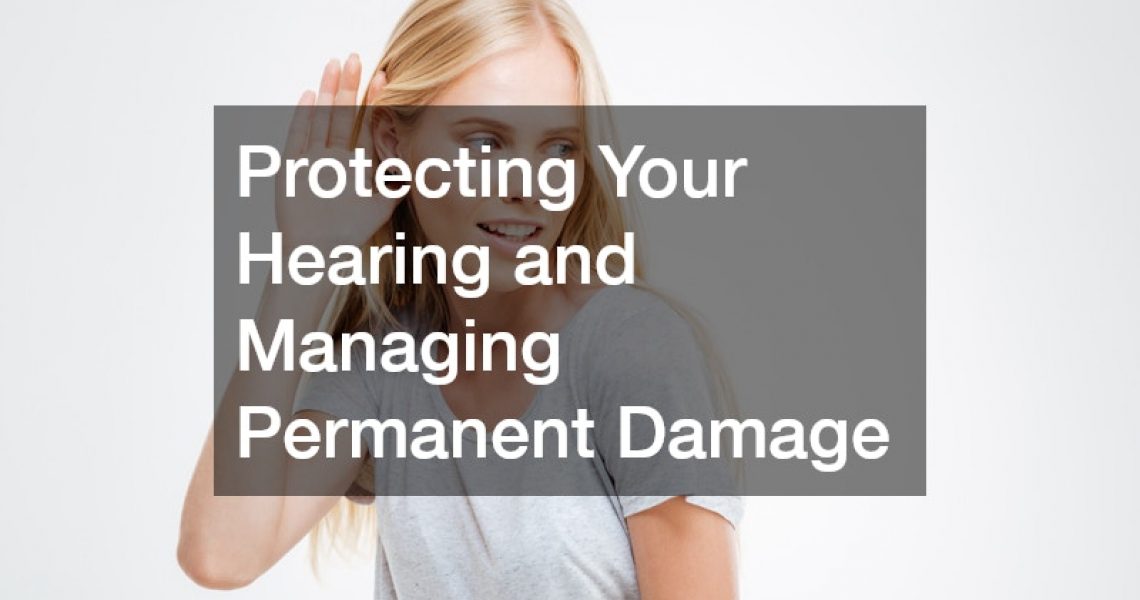Hearing is a vital sense that allows us to navigate our surroundings and connect with others. Unfortunately, hearing damage can accumulate over time, leading to permanent issues that cannot be reversed. While the effects of hearing loss can sometimes seem subtle, they often become permanent after repeated exposure to loud noises or other damaging factors. Understanding how hearing damage occurs and knowing the steps to protect your ears are essential to preserving this critical sense.
Temporary vs. Permanent Hearing Damage
Many individuals have experienced a temporary change in hearing after being exposed to loud environments, such as concerts, construction sites, or noisy events. This is called a temporary threshold shift, where hearing may feel muffled, accompanied by ringing in the ears (tinnitus).
These symptoms usually disappear after a day or two, with hearing returning to normal. However, despite feeling temporary, each instance contributes to gradual hearing damage over time.
With ongoing exposure, the hair cells in the inner ear—responsible for sending sound signals to the brain—suffer permanent damage. Once these cells are damaged, there is currently no method to regenerate them. This underscores the importance of prevention and protection to maintain long-term hearing health.
Early Detection through Audiological and Vestibular Tests
Detecting hearing loss early is critical to managing and preventing further damage. Audiological and Vestibular Tests are essential tools used by healthcare professionals to assess the function of the auditory and vestibular systems. Audiological tests measure hearing ability, identifying the specific frequencies where hearing loss may occur. Vestibular tests evaluate balance and inner ear function, which can sometimes be linked to hearing issues.
Regular Audiological and Vestibular Tests help to detect early signs of hearing loss, particularly in individuals who are frequently exposed to loud environments. By identifying issues before they become severe, it becomes easier to take preventive measures and consider management options to maintain the best possible hearing health.
Preventing Further Damage
Once permanent hearing damage has occurred, there is no way to restore the lost hearing. However, there are several strategies to protect your remaining hearing and prevent further deterioration:
1. Use Hearing Protection
One of the most effective ways to prevent hearing damage is by using ear protection in noisy environments. Earplugs and earmuffs are widely available and offer varying levels of noise reduction. If you work in a noisy industry, attend concerts, or engage in loud hobbies, consistently using hearing protection can significantly reduce your risk of further damage.
2. Limit Exposure to Loud Environments
Reducing the amount of time you spend in loud environments can also help protect your hearing. Be mindful of the noise levels in places such as nightclubs, sporting events, or while using power tools. Taking breaks in quieter areas or limiting exposure can minimize the cumulative damage caused by noise.
3. Monitor Volume Levels
Personal audio devices, such as headphones or earbuds, can cause significant hearing damage if used at high volumes for extended periods. A good rule of thumb is to keep the volume at no more than 60% of the maximum level and to take breaks every hour to give your ears a rest. Many smartphones and audio devices now include settings to limit maximum volume, helping users protect their hearing.
4. Schedule Regular Hearing Checkups
Even if you feel your hearing is normal, regular checkups can help detect any early signs of hearing loss. As mentioned earlier, Audiological and Vestibular Tests are valuable tools in monitoring hearing health over time. These tests can also determine if any changes in hearing are related to other conditions, such as balance issues or inner ear disorders.
Managing Permanent Hearing Damage
If you have already experienced permanent hearing damage, several management strategies can help you maintain a good quality of life and prevent further damage:
1. Hearing Aids
Hearing aids are one of the most common solutions for individuals with permanent hearing loss. These devices amplify sound, making it easier to hear and communicate in various settings. Today’s hearing aids are more advanced than ever, with options that include noise cancellation, wireless connectivity, and customized settings based on your specific hearing needs.
2. Cochlear Implants
For individuals with severe hearing loss, cochlear implants may be suggested as a solution. In contrast to hearing aids that only amplify sound, cochlear implants bypass the damaged hair cells in the ear and directly stimulate the auditory nerve. This enables the brain to process sounds, although adapting to the new auditory signals typically requires time and practice.
3. Assistive Listening Devices
In addition to hearing aids, assistive listening devices can enhance your ability to hear in specific situations, such as watching TV, attending meetings, or using the phone. These devices work by amplifying sound or transmitting it directly to your hearing aid or cochlear implant.
4. Protecting Remaining Hearing
Even after hearing loss has occurred, it is crucial to continue protecting your ears from further damage. Continued use of hearing protection in loud environments and monitoring sound levels on personal audio devices remain important practices. Additionally, working with an audiologist to monitor your hearing over time ensures that any further loss is detected early, and necessary adjustments can be made.
The Importance of Ongoing Hearing Health
Hearing is not a sense we should take for granted. Permanent hearing loss, while irreversible, can be managed through a combination of protective measures and the use of technology like hearing aids. Early detection through Audiological and Vestibular Tests is key to identifying any problems and taking action before further damage occurs.
By protecting your ears in noisy environments, limiting exposure to loud sounds, and using appropriate management strategies if hearing loss has already occurred, you can preserve your hearing for as long as possible. With proper care and attention, you can enjoy the benefits of healthy hearing throughout your life.
.


